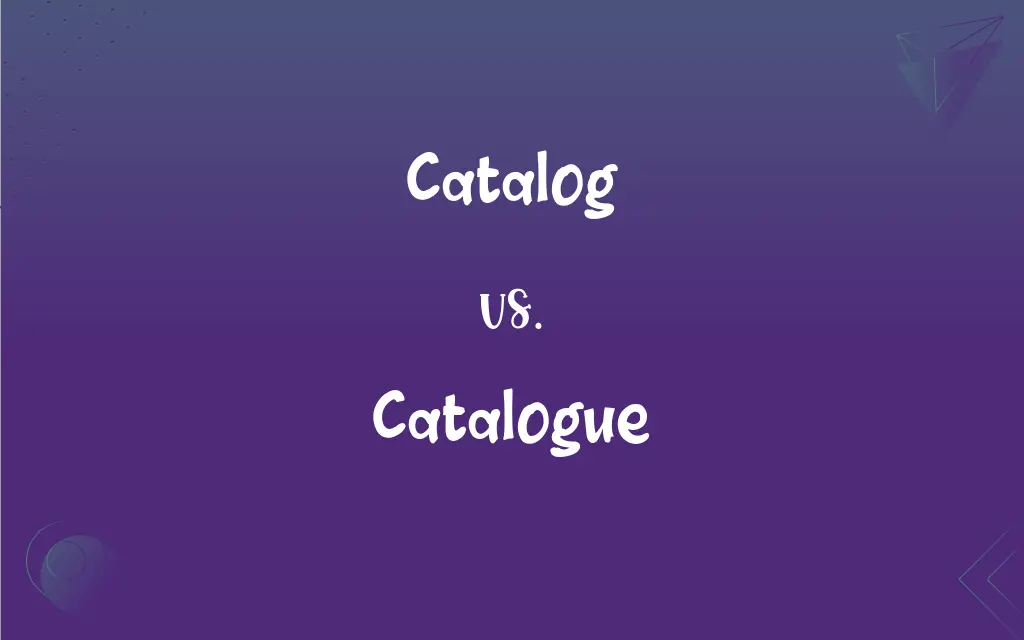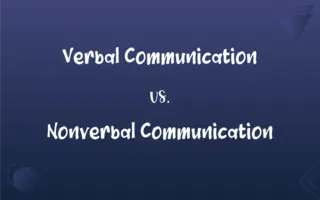Catalog vs. Catalogue: What's the Difference?
Edited by Janet White || By Harlon Moss || Updated on October 19, 2023
"Catalog" is the American English spelling, while "catalogue" is the British English spelling; both refer to a list or record of items.

Key Differences
"Catalog" and "catalogue" essentially convey the same meaning: a systematic list or record, often with descriptions or illustrations, of items such as books, products, or specimens. The primary distinction between them lies in their regional usage.
In American English, "catalog" is the preferred spelling. Americans might say, "The university's course catalog provides detailed information on each program." In contrast, "catalogue" is favored in British English, where someone might note, "The art gallery has a beautiful catalogue of its exhibits."
Although these words have the same origin and similar usage, modern-day technological advancements have further blurred the lines. In the digital realm, the term "catalog" is commonly used worldwide, even in places where British English predominates.
Despite the global trend toward standardization in some contexts, it's crucial to remain aware of these regional differences in spelling. Especially in formal writing, using "catalog" in American English and "catalogue" in British English will ensure linguistic accuracy.
Recognizing the appropriate context for each spelling can aid in clear communication. For instance, while an American company might advertise its online "catalog," a British library might promote its vast "catalogue" of books.
ADVERTISEMENT
Comparison Chart
Meaning
A list or record of items.
A list or record of items.
Regional Usage
American English.
British English.
Examples
Product lists, digital databases.
Library books, art exhibits.
Digital Context
Commonly used globally in digital contexts.
Less common in digital contexts.
Formality
Formal in American English.
Formal in British English.
ADVERTISEMENT
Catalog and Catalogue Definitions
Catalog
A collection of items for sale.
I browsed the store's catalog looking for a new dress.
Catalogue
A systematic list or record.
The library's catalogue contains millions of books.
Catalog
A systematic list or record.
The museum has a digital catalog of all its artifacts.
Catalogue
A comprehensive list of items, often in a specific order.
She maintained a catalogue of all her collectible coins.
Catalog
A database in the digital domain.
Our software uses a product catalog to manage inventory.
Catalogue
An official list or record, often with detailed descriptions.
The gallery issued a catalogue for their new exhibition.
Catalog
An official publication listing courses offered by an educational institution.
The college's course catalog was extensive.
Catalogue
A collection of items available for purchase.
The company released their winter catalogue filled with new designs.
Catalog
A list of works, articles, or musical pieces.
The composer's catalog spans several decades.
Catalogue
A manual listing all the offerings of a company or institution.
Students referred to the university's course catalogue to plan their semester.
Catalog
A list or itemized display, as of titles, course offerings, or articles for exhibition or sale, usually including descriptive information or illustrations.
Catalogue
A list or itemized display, as of titles, course offerings, or articles for exhibition or sale, usually including descriptive information or illustrations.
FAQs
Is there a difference in pronunciation between the two?
Generally, no, they are pronounced similarly.
Is the meaning of "catalog" and "catalogue" different?
No, they both refer to a systematic list or record of items.
What's the fundamental difference between "catalog" and "catalogue"?
"Catalog" is American English, and "catalogue" is British English; both refer to a list of items.
Can software have a "catalog"?
Yes, many software applications, especially e-commerce platforms, have product catalogs.
Can "catalog" refer to a digital database?
Yes, especially in modern contexts, "catalog" can refer to a digital list or database.
Is the word "catalog" or "catalogue" used in specific industries?
Yes, industries like retail, academia, and libraries frequently use the term.
Can I use "catalog" in British English?
While "catalogue" is preferred in British English, "catalog" is understood and sometimes used, especially in digital contexts.
How did the difference in spelling originate?
It's a result of linguistic evolution and differences in American and British English over time.
Do Canadians use "catalog" or "catalogue"?
Canadians generally use "catalogue," aligning with British English.
How should I choose which spelling to use?
Consider your audience; use "catalog" for American readers and "catalogue" for British readers.
Is one spelling more formal than the other?
Both are formal, but the choice depends on regional usage.
Is there a difference in the plural forms of these words?
No, both become "catalogs" or "catalogues" respectively.
Can "catalog" be used as a verb?
Yes, in both American and British English, "catalog" or "catalogue" can be a verb meaning to list or classify items.
Which spelling is more prevalent in the digital world?
"Catalog" is more common globally in digital contexts.
Is "catalogue" used in American publications?
While "catalog" is more common, "catalogue" might appear, especially in older publications or for stylistic reasons.
Can "catalogue" refer to a list of courses in a university?
Yes, especially in British English, a "catalogue" can list university courses.
What's the adjective form of "catalog" or "catalogue"?
The adjective form is "cataloged" or "catalogued."
Are there derivatives of these words?
Yes, like "cataloger" (American English) and "cataloguer" (British English) referring to someone who creates or maintains catalogs.
Are there any other regional variations for these words?
The main distinction is between American and British English, but other English-speaking regions may have preferences based on their influences.
Are there synonyms for "catalog" or "catalogue"?
Yes, synonyms include "list," "inventory," "register," and "directory."
About Author
Written by
Harlon MossHarlon is a seasoned quality moderator and accomplished content writer for Difference Wiki. An alumnus of the prestigious University of California, he earned his degree in Computer Science. Leveraging his academic background, Harlon brings a meticulous and informed perspective to his work, ensuring content accuracy and excellence.
Edited by
Janet WhiteJanet White has been an esteemed writer and blogger for Difference Wiki. Holding a Master's degree in Science and Medical Journalism from the prestigious Boston University, she has consistently demonstrated her expertise and passion for her field. When she's not immersed in her work, Janet relishes her time exercising, delving into a good book, and cherishing moments with friends and family.































































